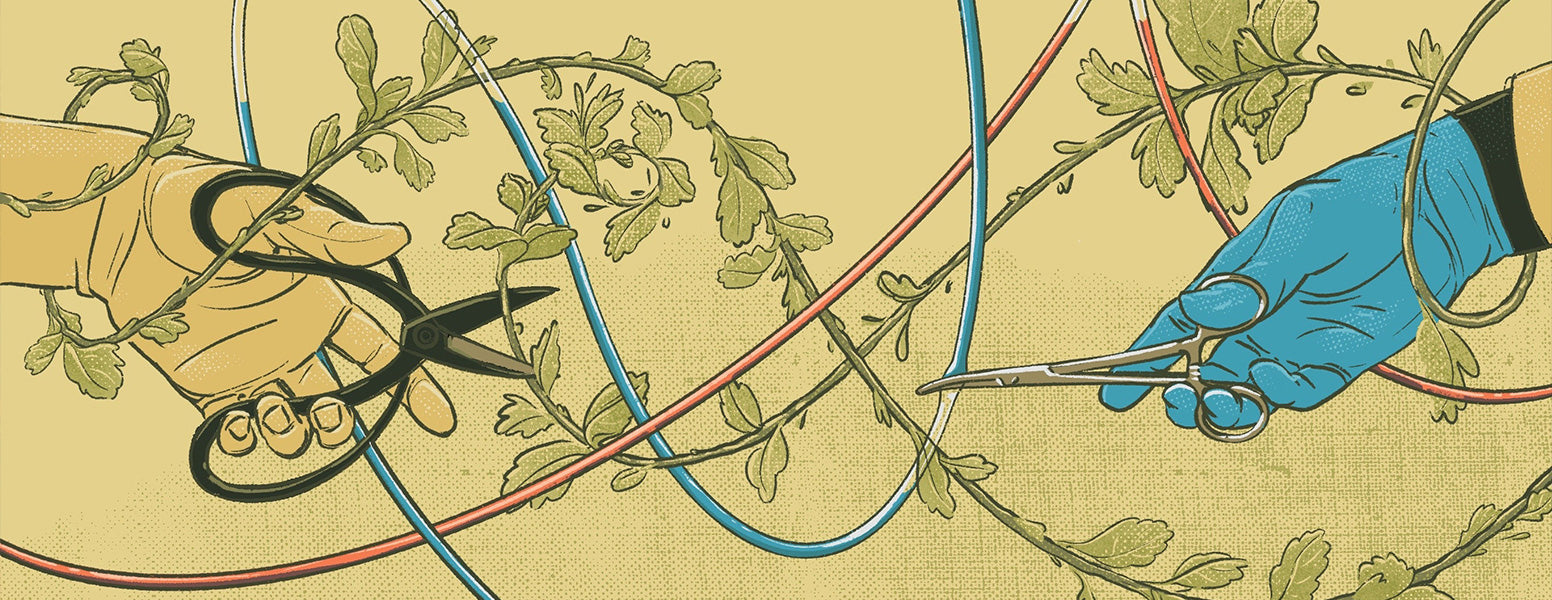How do you define "alternative" veterinary medicine?
When you consider that the National Institutes of Health can't decide what to call its branch dedicated to alternative medicine (it's been known, consecutively, as the Office of Alternative Medicine, the National Center for Complementary and Alternative Medicine, and the National Center for Complementary and Integrative Health), you see the difficulty of imposing definitions onto this ever-evolving area of study and practice. Nevertheless, we'll give it a shot. Here are some terms you'll hear bandied about by folks on both sides of the fence dividing "alternative" from "mainstream."
Allopathic. A medical approach that seeks to produce the opposite effects of those caused by illness and injury (it means, literally, "other than disease"), usually through the use of drugs and surgery. Many alternative practitioners use this word negatively to imply a reductionistic healthcare philosophy. It's more or less synonymous with "Western," "mainstream," "traditional," "conventional" and "modern."
Alternative. An umbrella term for any therapeutic practice not considered standard in mainstream medicine. "Alternative" is often used interchangeably with "integrative," "complementary," and "holistic," though there are subtle differences (see below). It's also sometimes used to describe therapies for which there is little scientific evidence, but many modalities considered alternative, such as acupuncture, have considerable research to support them.
CAM. A widely used acronym that stands for "complementary and alternative medicine."
Complementary. An alternative medical practice that's used in conjunction with standard modalities such as drugs and surgery. See "integrative."
Evidence-based. Used to describe treatments that have been proved effective by scientific research, most notably by multiple double-blinded, placebo-controlled studies. Some proponents of an evidence-based approach say there shouldn't be a dichotomy between "alternative" and "mainstream" but that any given therapy should be evaluated in terms of its scientific support (or lack thereof).
Functional. Sometimes used interchangeably with "integrative," "naturopathic," and "holistic" care, functional medicine specifically focuses on the root causes of chronic disease and addresses those rather than the disease itself (i.e. "symptom suppression"). It is highly individualized with lots of emphasis on nutrition and lifestyle.
Holistic. Often used synonymously with "alternative" and "integrative," this word essentially means treating the whole person vs. a single body part, system, or disease. Practitioners of all stripes purport to do this, so it is less useful in describing a specific approach to care. One note, though. Someone who uses "holistic" to describe what they do may be more likely to incorporate mind-body practices such as meditation or Reiki in their approach.
Integrative. A way of practicing medicine that combines complementary and conventional practices in a way that's supported by evidence and centered on the whole patient.
Naturopath. A healthcare practitioner who attempts to address disease without the use of drugs or surgery by focusing primarily on nutrition, exercise, massage, and other lifestyle factors to support the body's natural healing processes. Related words—at least in structure, if not in practice—include "osteopathy" (a branch of medicine that emphasizes physical manipulation of body tissues) and "homeopathy" (giving tiny amounts of a disease-causing agent in the belief that "like cures like"). These words all affix a prefix corresponding to their philosophy to the same root word, which means "disease" or "ill feeling."
Neuromodulation. The alteration of nervous system activity through delivery of a stimulus, such as an electrical current or magnetic field. Some practitioners claim that acupuncture is a form of neuromodulation, and many proponents of laser therapy have begun to use the similar term "photobiomodulation" to describe what they do.
Nutraceutical. Any product derived from a food source that is thought to have additional health benefits beyond its nutritional value. Related terms include "nutritional supplement," "herbal medicine," "botanical medicine," and "phytotherapy."
Skeptic. In the world of medicine and healthcare, a skeptic is an individual who tends to dismiss the claims of alternative practitioners and prioritize only those therapies that have been upheld by experimentation via the scientific method (see "evidence-based," above).
